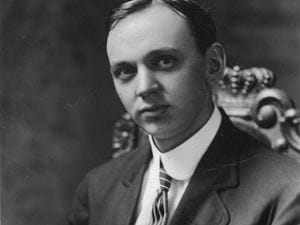
You were born with a purpose, but do you how to find it?
Dr. Mark Thurston is here to help. But first, let’s begin with a story.
In 1892, a young boy—the best student in his school—was asked by his teacher how he had come to be so adept at his schoolwork. Once, the boy had struggled—so much so that the school was compelled to tell his parents of his performance.
But when the question of his sudden improvement was put to him, he told the teacher something shocking.
He saw images of what was in the books without ever having to open them.
The boy’s name was Edgar Cayce, and within a few decades, this young Christian would become what many called the “Sleeping Prophet,” a man able to enter a trance-like state and access some vast well of hidden knowledge and wisdom.
From this well, Cayce would go on to draw forth information for individual clients, helping them heal their bodies of disease, giving esoteric knowledge, and helping these people find their purpose.
It is the latter function that we now focus on. Between the years of 1923 and 1944, Cayce gave around 1900 of what he called “life readings”—readings designed to help others find their life’s purpose.
Dr. Mark Thurston’s book, “Discovering Your Soul’s Purpose,” distills the psychological and spiritual pattern of insights found in these readings, binding them all up into a single volume. If you feel the pain of purposelessness, the dissatisfaction of an unfulfilled life, or the restlessness of mediocrity, the wisdom of Edgar Cayce can help you find the way.
Let’s take a brief look at a few purpose-finding tips from Thurston’s book so that you can begin your own journey.
Cooperate
Cooperation—with “God, ourselves, and others,” as Thurston writes, is an essential first step toward finding your purpose in life. This means being open to connections both with things bigger than you, and with yourself.
Think, first, on how your own fulfillment is linked to the wellbeing of those around you. Being good to others not only invites them to be good to us in turn, but also simply taps into the innate human desire to do good. Human beings are wired to care for one another, and when we do, we invite peace into our lives.
But there’s a more difficult aspect to Cayce’s concept of cooperation—cooperation with the self. Have you ever held yourself back from doing something you loved? Have you ever engaged in negative self-talk?
These things hold you back from grabbing hold of your purpose, even when you know exactly what it is. Be willing to start working with yourself, accepting who you are without criticism.
The willingness to love, appreciate, and cooperate with all parts of yourself sets the stage for everything else you’ll do in order to find your life’s purpose.
Know Yourself
Once you learn to cooperate with yourself and the world around you, you’ll need to begin truly getting to know yourself in order to find your purpose.
Thurston acknowledges that this phase of Cayce’s philosophy is a difficult one—with all of life’s distractions and demands keeping us from self-reflection, the self is elusive.
Cayce divided this search for the self into two areas—the inner and the outer. The study of the inner self is a journey of self-analysis and meditation. You’ll need to purposefully become aware of your habits of mind. Take some alone-time to examine your thoughts and feelings. Are there aspects of your life with which you are uncomfortable or dissatisfied? Do you find yourself repeatedly wishing for some certain change? These are great places to begin your inner journey.
Conversely, the study of the outer self is a look into your own relationship to the outer world. There will be times when someone says something that strikes you as profound. They may have no idea, but they’ve just helped you discover a part of yourself—pay attention to this.
Look, also, to the acts of service you perform. These are things you do simply because you care, and speak volumes of who you are. What are they?
The study of your self, according to Thurston, is a balance between these two paths. But since the self is constantly evolving, this is a journey of discovery which should never end.
Identify Your Core Values
So you’ve turned off your internal criticism and have gotten to know yourself a little. Now, it’s time to start identifying your core values.
Cayce gave great importance to ideals and purposes, according to Thurston—this means that they should be important to us, too.
Your core values are the lighthouse that guides you where you need to be. They are the framework in which you make decisions and decide how you’re going to view the world.
To find your values, you’ll need to look past the material. Things like cash and fast cars aren’t values—they’re things.
Next, Cayce recommends finding something to which you can aspire. His is own recommendation for this is Christ—aspiring to His spiritual ideals and qualities. These qualities may seem impossible to reach, but the very act of reaching gives us that lighthouse we so desperately need.
Finally, you must get in touch with your individuality so that you can reach your aspiration in your own, unique way. Cayce recommends that we look for qualities in others that we admire—we’re likely to share them.
List those qualities out and begin developing them. If your path to being like Christ—or whatever your greater aspiration might be—lies in being especially kind, develop kindness. If it lies in intelligence, develop that trait.
Find out what you value, and you find your purpose.
Have Faith
Your purpose doesn’t have to be bound up in a job or a certain role—this is simply a broad direction for your life. Find it, and you’ll be directly fulfilled by what you do, rather than by what your doings earn.
Most people, Thurston writes, never find this. But have faith that there is a greater purpose to all of creation—and consequently, to your very life. You are meaningful and valuable and unique, and no one else can fulfill your role.
The world needs you. Find your place in it, and you’ll play the part you were born into.

